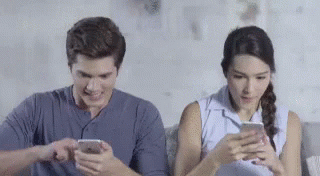As five days doesn’t sound like an extreme experiment, I didn’t expect to get many eureka moments during it— but I was wrong. Relying on my own experience and the recent studies about stress, I highly recommend taking occasional breaks from social media.
This is what inspired me to try it, and here are the results of my 5-day social media ban:
I was more productive
Taking a break from social media felt like purchasing more time. I had more hours and minutes to use.
When I didn’t browse and spend time carelessly, I got things done.
One of my favorite part of the experiment was that I finally found more time to read. I’ve been dreaming of reading more books, but I’ve struggled with making enough time for it.
Ignoring social media did the trick, and thus vanished the layer of dust from my books.
I felt less stressed
Fewer distractions, less clutter in my head, less self-observed stress. More peace of mind, more stillness.
The researchers were right, giving up Facebook seems to reduce stress.
I was on autopilot when I grabbed my phone
To my surprise, I often reached my phone very automatically, without being fully aware until I was already tapping the screen. Every time I caught myself grabbing the phone on autopilot, I was either tired or mentally stuck with my work and needed a break from my thoughts.
However, that’s not the best way to spend a break regarding productivity. Now when I feel a bit worn out, I’ll take a power nap or some fresh air instead of my phone. Being aware of one’s behavior makes it easier to manage.
I replaced the stillness with social media
“Live what you preach” wasn’t entirely true with this one, I must admit. I wrote about beating your phone and embracing the stillness, and still, I caught myself breaking the silence with the hustle and bustle of my phone! Oh, the self-realization.
Note to self (again):
Let your mind wander freely. You don’t need all that clutter all the time.

I understand myself better
The study that inspired my experiment discovered a strange result on participants: even though their stress levels dropped down due to the Facebook ban, their life satisfaction went down as well. They felt like they were missing out on something.
Even though I was in doubt, something similar happened to me. On the fourth day, I started to miss social media. My mind whispered that there must be something interesting going on, and I was longing for that sweet little dopamine burst that anticipation of a notification creates in the brain.
Dopamine is quite a fascinating hormone when you get to know it. You can feel it in action when you’re excitedly waiting for a reply or a notification. Interestingly, dopamine level is even higher during the anticipation of a reward compared to finally getting the reward.

That’s why seeing the number on top of the application icon might feel better than actually opening it and seeing the notification! Understanding the reasons behind our feelings helps us to manage them.
I’ve used it less after the experiment
The detox was great. I‘m now more conscious of my behavior, I stopped using social media without being entirely aware of it, and I learned to use it in moderation. In fact, I didn’t even realize how much I’d been browsing on my phone before this experiment.
It’s been over a week now, and I can still see the results. Reading more, being more productive, feeling less stressed.
I’m in control of the way I spend my time.
Don’t get me wrong — I still like social media, and I’m not going anywhere. At its best, it’s a fountain of inspiration, a platform to find exciting news and articles, and a way to communicate with friends. But I prefer sitting in the driver’s seat.
Have you ever tried to take a break? Do you feel that you’re in control of your phone usage? It would be interesting to hear your experiences.
Little known facts about stress ← PREVIOUS
THE STORY I’M REFERRING TO → Giving up Facebook reduces stress, a new study says. Challenge accepted!

This story is published in The Startup, Medium’s largest entrepreneurship publication followed by 317,238+ people.
Subscribe to receive our top stories here.

Originally published at medium.com


